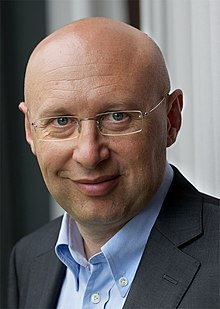Stefan Walter Hell | |
|---|---|
 Hell in 2010 | |
| Born | 23 December 1962 Arad, Romania |
| Citizenship | Germany Romania |
| Alma mater | Heidelberg University |
| Occupation | Physicist |
| Known for | STED microscopy RESOLFT GSD microscopy 4Pi microscope Multifocal multiphoton microscopy Three photon microscopy |
| Awards | Nobel Prize in Chemistry (2014) Kavli Prize in Nanoscience (2014) Otto Hahn Prize (2009) Gottfried Wilhelm Leibniz Prize (2008) |
| Scientific career | |
| Fields | Physics, optics |
| Institutions | Max Planck Institute for Multidisciplinary Sciences (1997–) Max Planck Institute for Medical Research (2016–) German Cancer Research Center (2003–17) University of Turku (1993–96) |
| Thesis | Imaging of transparent microstructures in a confocal microscope (1990) |
| Doctoral advisor | Siegfried Hunklinger |
| Notable students | Ilaria Testa (postdoc) Francisco Balzarotti (postdoc) |
Stefan Walter Hell (German pronunciation: [ˈʃtɛfan ˈhɛl] : born 23 December 1962) is a Romanian-German physicist and one of the directors of the Max Planck Institute for Multidisciplinary Sciences in Göttingen,[1] and of the Max Planck Institute for Medical Research in Heidelberg,[2] both of which are in Germany. He received the Nobel Prize in Chemistry in 2014 "for the development of super-resolved fluorescence microscopy", together with Eric Betzig and William Moerner.[3]
- ^ "Department Hell". Max Planck Institute for Multidisciplinary Sciences. Retrieved 1 January 2024.
- ^ "Department of Optical Nanoscopy". Max Planck Institute for Medical Research. Retrieved 1 January 2024.
- ^ "Nobelprize.org". Retrieved 11 June 2017.